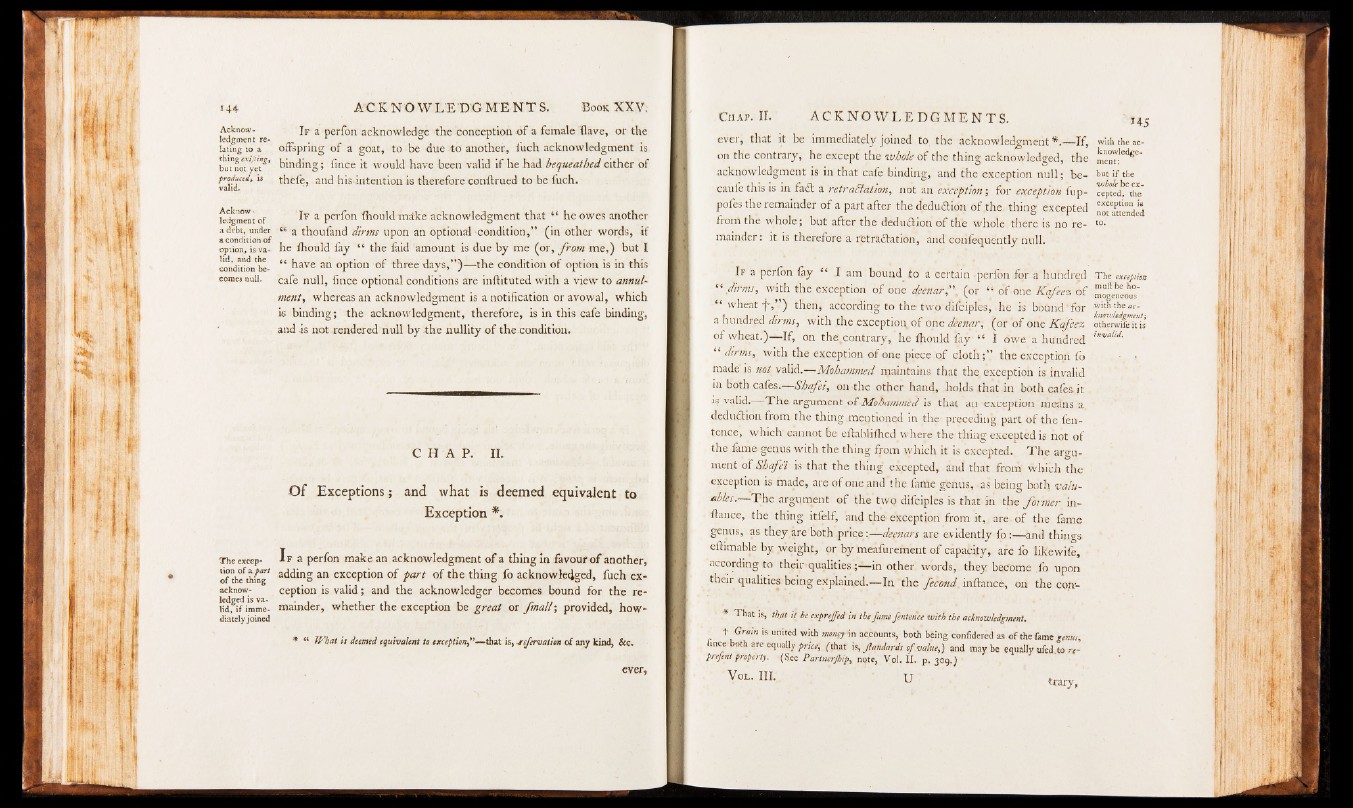
144 A C K N O W L 'E 'D'G M E N T S. Book XXV;
Acknowledgment
relating
to a
thing exi/iing,
but not yet
produced\ is
valid.
Acknow •
Iedgment o f
a debt, under
a condition o f
option, is valid,
and the
condition becomes
null.
The exception
o f a part
o f the thing
acknowledged
is valid,
i f immediately
joined
If a perfon acknowledge the conception of a female Have, or the
offspring of a goat, to be due to another, fuch acknowledgment is
binding; fince it would have been valid if he had bequeathed either of
thefe, and his intention is therefore conftrued to be fuch.
If a perfon fhould mike acknowledgment that “ he owes another
- a thoufand dirms upon an optional -condition,” (in other words, if
he fhould fay “ the faid amount is due by me (or, from me,) but I
“ have an option of three days,”)—the condition of option is in this
cafe null, fince optional conditions are inflituted with a view to annulment,
whereas an acknowledgment is a notification or avowal, which
i6 binding; the acknowledgment, therefore, is in this cafe binding,
and is not rendered null by the nullity of the condition.
C H A P . II.
Of Exceptions ; and what is deemed equivalent to
Exception *.
I f a perfon make an acknowledgment of a thing in favour of another,
adding an exception of fart of the thing fo acknowledged, fuch exception
is valid ; and the acknowledger becomes bound for the remainder,
whether the exception be great or fmall ; provided, how-
* M What is deemed equivalent to exception”—that is, jrefervation of any kind, &c.
ever,
ever, that it be immediately joined to. the acknowledgment —If,
on the contrary, he except the whole of the thing acknowledged, the
acknowledgment is in that cafe binding, and the exception null; be-
caufe this is in fa£t a retractation, not an exception; for exception fup-
poles the remainder of a part after the dedudtion of the. thing excepted
from the whole; but after the deduction of the whole tl lere is no re-
mainder: it is therefore a retractation, and confequently null.
If a perfon fay “ I am bound to a certain .perfon for a hundred
“ firms, with the exception of one <deenarf\ (or “ o’f-ohe Kafeez of
w h e a t t h e n , according to the two difciples,-he is bbCmd'for
a hundred dirms, with the exception^of one deenar j (or of one Kafeez
of wheat.)—If, on the',contrary, he fhould fay “ I owe a hundred
“ dirms,' with the exception of one piece of cloth;” the exception fo
made is not valid.—Mohammed maintains that the, exception is invalid
in both cafes.—Shafei, on -the other hand, holds that in both cafes it
is valid.—The argument of Mohammed is that an exception means a,
deduction from the thing mentioned in the preceding part of the fen-
tence, which Gannot be eflablifhed where the thing excepted is not of
the fame-genus with the thing from which it is'excepted. The argument
of Shafei is that the thing expepted, and that from' which the
exception is made, are of one and the fame genus, -as being both valuables.—
The argument of the two difciples is .that in the former in-
fiance, the thing itfelf, and the exception from it,, are. of the fame
genus, as they .are both price:—deenar s are evidently fo:—and things
eflimable by weight, or by meafurement of capacity, are fo like wife,
according to their qualities;—in other words, they become fo upon
their quahties being explained.—I n ’the fecond, inflance, on the cpn-
* T h a t is, that it be exprejjid in the fame fentence with the acknowledgment.
t Gram is united with money in accounts, both being confidered as o f the fame genus,
fince both are equally price, ( that is, Jiandards o f ,value,) and may be equally ufed to re~
prefentproperty. (See Partnerjbip, nqte, V o l. II. p. 309.)
Vol. III. piwith
the acknowledgement:
but i f the
•whole be excepted,
the
exception i«
not attended
to.
The exception
mull be homogeneous
with the acknowledgment
i
otherwife it is
invalid.
trary,